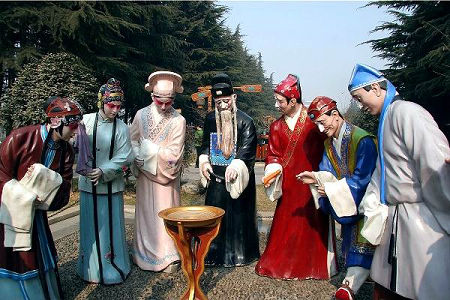Overview of Qinqiang opera from Shaanxi Province

Qinqiang
(秦腔) is the representative folk Chinese opera of the northwest Province of Shaanxi, China, where it was called Qin thousands of years ago. Its melodies were originated from the rural areas of ancient Shaanxi and Gansu.Also dubbed Luantan (乱弹), Qinqiang opera is a local Chinese opera that mainly thrives in Shaanxi Province, as well as its neighboring regions in Northwest China, like Gansu Province, Qinghai Province, Ningxia Hui Autonomous Region and Xinjiang Uyghur Autonomous Region.
Origin
It is said that the opera was called "the Emperor Qinshihuang's opera" during the Tang period (618-907) and was later renamed Qinqiang Opera, which boasts the most ancient, affluent and largest musical system of all Chinese operas.
The opera first originated from local folk songs and dance forms in the Yellow River Valley of Shaanxi and Gansu provinces - the birthplaces of Chinese culture. As an opera art form, Qinqiang evolved in ancient China's political, economic and cultural center - Chang'an - with the persistent efforts of the local people over generations.
According to historical records, the opera "first appeared in the Qin Dynasty (221BC-207BC), experienced great refinement in th Han Dynasty (206BC-220BC), flourished in the Tang, was integrated as an opera form in the Yuan Dynasty (1271-1368), matured in the Ming Dynasty (1368-1644) and became widespread in the Qing Dynasty (1644-1911)." Its time-honored history has endowed Qinqiang with a reputation as "the forefather of Chinese operas".
Qinqiang is also one of the earliest operatic musical systems to reflect the emotions of human beings. Equipped with a set of performing skills created by the artists, Qinqiang has greatly influenced other operatic forms. During the Qing Dynasty, Qinqiang opera entered Beijing and directly affected the formation of Beijing Opera.
Qinqiang opera thrived during the reign of Emperor Qianlong (1736-1795) when Qinqiang troupes were disseminated throughout the country; In Northwest China's city ofXi'an alone there were 36 Qinqiang troupes.
 0
0 







Go to Forum >>0 Comments